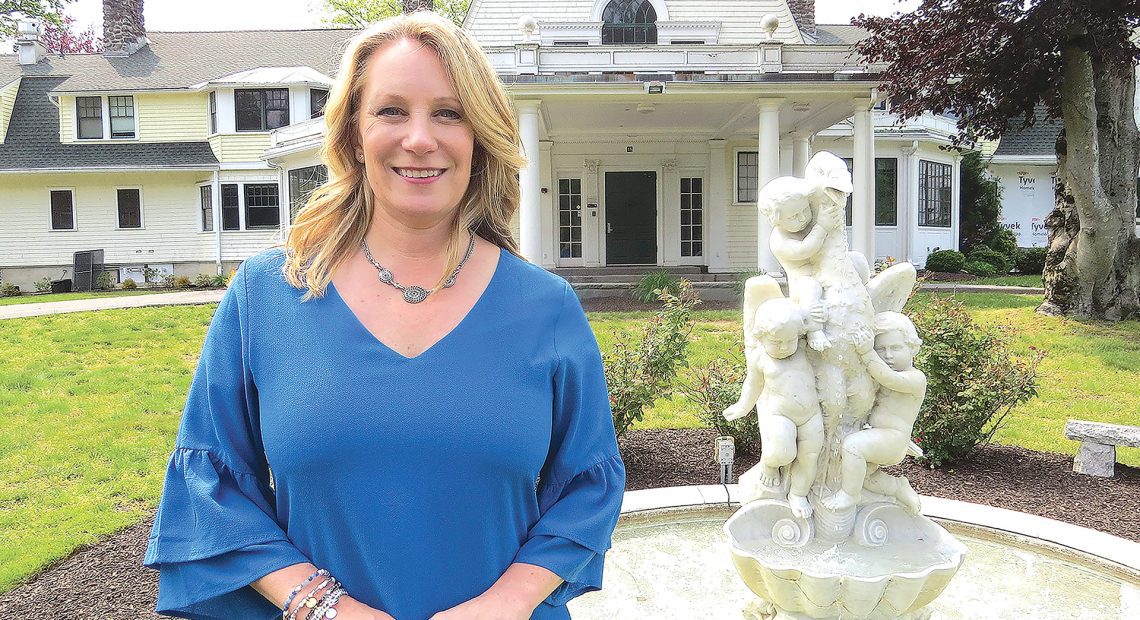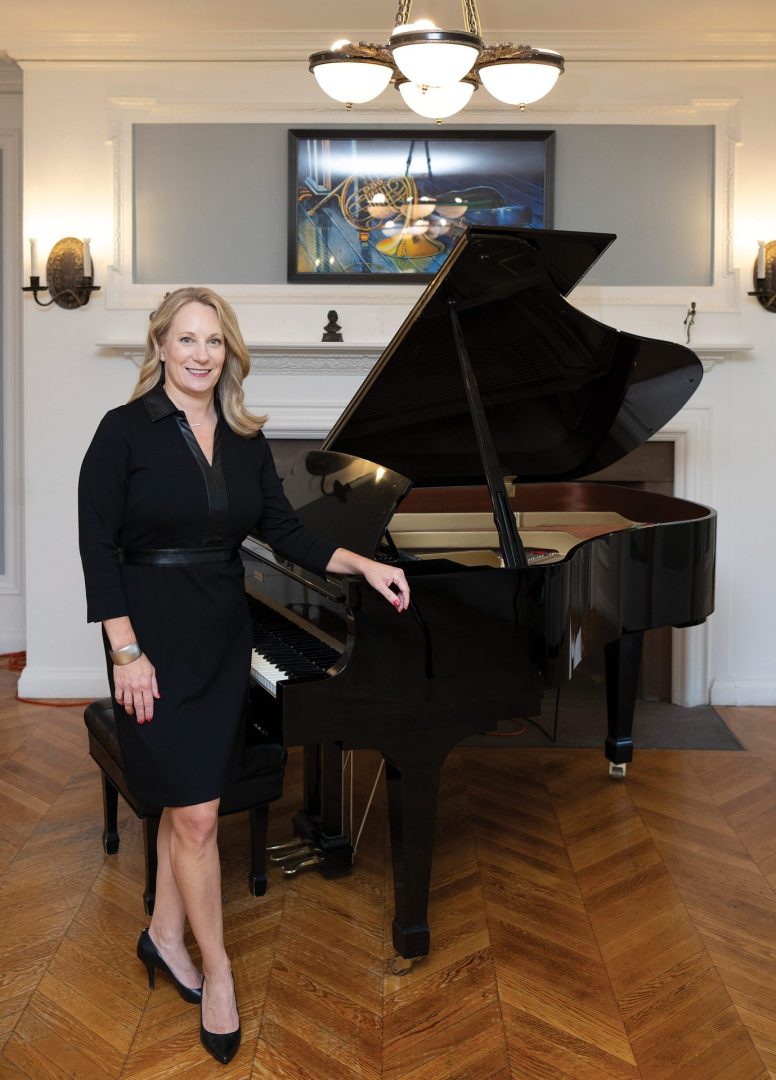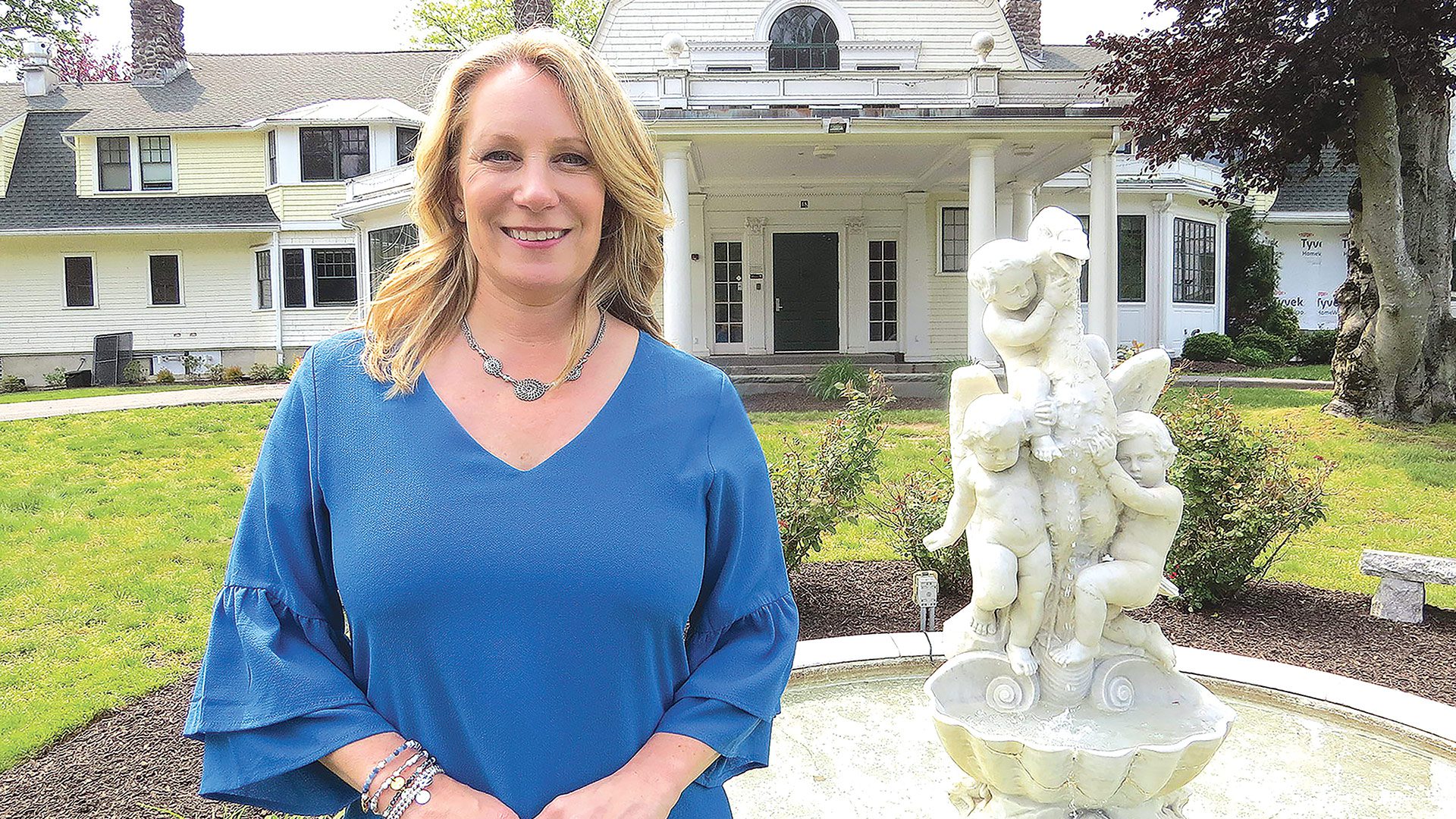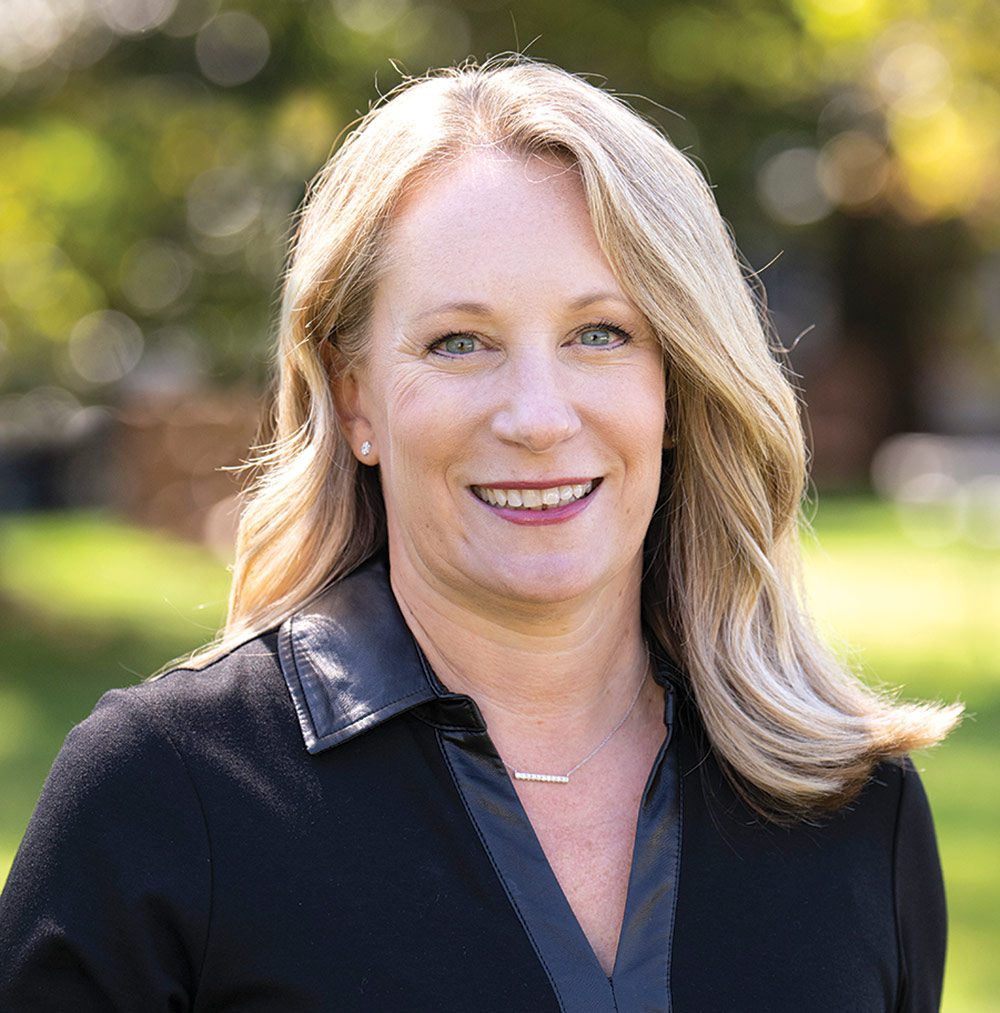
Michelle Theroux
CEO, Berkshire Hills Music Academy
She Helps Young Adults with Disabilities Build a Lifetime of Ability

Growing up in South Hadley, Michelle Theroux would ride by the old Skinner family residence on Route 116, just north of Mount Holyoke College, and have no clue what it was.
Or what it would become.
“Wistariahurst in Holyoke was the family’s winter home, and this was their summer home,” she told BusinessWest. “And when the last living Skinner passed away, this property went to Mount Holyoke. But it never had an identity within the campus, so around 1998, they were looking to divest several of their properties.”
Among the interested buyers were the founders of Berkshire Hills Music Academy, which will celebrate a quarter-century next year as a unique, college-like program for young adults with intellectual and developmental disabilities who are looking to expand their social, vocational, and music skills in a decidedly music-infused environment.
Theroux came on board in 2013, providing some needed stability. As in much-needed.
“I was the eighth executive director in our 13-year history when I was hired,” she said. “When I spoke with the recruiter, I said, ‘you have to give me the backstory. Am I walking onto the Titanic? What’s going on here?’”
The answer, she decided, was ‘founder syndrome’; the institution had some strong founding families who had competing visions, so there wasn’t one consistent direction, which burned out each director quickly. In fact, when Theroux reached just 20 months on the job, she became the school’s longest-tenured leader ever.
“I was able to get some traction with staff and make changes, as well as with the board. I said, ‘if we’re going to do what we need to do, here’s how we’re going to do it. And you’ve got to let me do my job. I can’t be second-guessed at every turn. We’re going to have to change.’”
It helped that her music background — she began studying tap, jazz, and ballet dance at age 5; added dance instruction when she was just 16; and later toured nationally in a jazz-based children’s show — gave her some “street cred” with the staff.
“I knew what it’s like to be on a gig; things like that allowed me to be a bit more successful than some of the predecessors.”
That success, a decade into Theroux’s tenure, is measurable. The student body was 32 when she arrived, and is past 75 now. “That’s capacity,” she said. “So for us to grow, we would be taking on a new building, most likely off-site and in the community somewhere.”
Which may happen at some point, because the school’s success extends far beyond numbers. It’s all about the total impact on these young adults’ lives.
Berkshire Hills boasts a day program and a residential program. “If they’re residential, they’re most likely living for the first two years in our dorm, and then they can live in the community after that,” she explained. “Our two-year program really focuses on shoring up their life skills — everything from cooking to money management, which includes going to the bank and then going shopping and making sure you have a list of what you need versus what you want.”
The entire program, in fact, is built around preparing students to live independently and successfully in the community.
“We have a whole course on social skills with friends, social skills in the workplace. We teach what language to use and what’s an appropriate hand gesture when you meet somebody: you shake their hand; you don’t give them a hug. Because a lot of times, it’s the soft skills that individuals who have intellectual and developmental disabilities may struggle with and could lead to potential conflict, say, in the workplace.”
“When I spoke with the recruiter, I said, ‘you have to give me the backstory. Am I walking onto the Titanic? What’s going on here?’”
Speaking of which, students also explore vocational skills and strengths. “We do a lot of volunteer opportunities in the community: at the local food pantries, the Dakin animal shelter, and a few other places, like Share Coffee, to see what their skill sets are, what their interests are. And then, as they go through our program, they match those skills with potential employment later on.”
But what really sets Berkshire Hills Music Academy aside is right there in the name.
“We are known for individuals who have an intellectual or developmental disability, who are highly musical,” Theroux explained. “We’re one of the very few places in the country where they can get lessons and programming, but we also act as their agent, their manager, their accompaniment, their arranger.”

Michelle Theroux says Berkshire Hills Music Academy is at capacity and may need to grow into another building in the community.
In fact, students are provided with opportunities to perform locally, both individually and in a number of different ensembles in different musical genres, and in settings ranging from local schools to Fenway Park, where students have sung the national anthem.
In short, these young adults are living full lives, enjoying and perfecting their music skills, and preparing to live independently after their enrollment at Berkshire Hills. And Theroux’s steady leadership has plenty to do with their success.
The Power of Music
Some gigs can be especially impactful for audiences.
“We have about 15 nursing homes or assisted-living facilities in a rotation that our bands will cycle through each year, and those facilities love having them,” Theroux said. “One reason is our students are super warm and embracing and fun. They’re also very talented.
“And there’s a connection between the aging brain and music,” she added. “For example, somebody with dementia or Alzheimer’s will have lapses in their memory, but they’ll hear a song, and it will bring them right back, and they’ll remember all the words to it. If it’s their wedding song or their prom song, whatever it is, they have a memory that gets triggered by the music. So we are a fan favorite in the local nursing homes.”
The school even has a dance ensemble that’s starting to pick up gigs as well, sometimes accompanied by a Berkshire Hills musician or ensemble, sometimes on their own.
Speaking of gigs, the young musicians earn money for appearances, with just a small percentage deducted to cover the school’s staffing costs, Theroux said. “They know there’s value to their work. Like you and I value our paychecks, so do they. So, yes, these are paid gigs.”
“We’ve really looked at the individual, and instead of just focusing on areas where they need support, because there’s a deficit there, we’ve looked at where their strengths are, where their passions are, where their gifts are, and really build on that.”
And when audiences hear them play, sing, and dance, they understand the value, too.
“When they hear our music, people are like, ‘wait, what? They have a disability?’ Because when you hear the music, you hear good music. You don’t hear a disability.”
That’s why these students have performed at other schools, too, funded by anti-bullying grants, to drive home the message of ability, not disability, Theroux said. “The message is, ‘if I have autism and can sing like this, you might have autism, so guess what? You, too, have skills; you, too, have talent; you, too, have strength.’ Our bands go into some schools, and they’re like rock stars.”
Berkshire Hills students don’t have to be highly musical to enroll, she added. “But if you are, there is a music track for folks where that can be their vocation. We have a secondary tier; we have several bands that gig in the community at a high level.”
These successes — in music and in life — are reflected in words of gratitude from families over the years, Theroux said.
“It’s everything from a parent telling us, ‘I never thought my child would shave his own face’ to becoming highly musical and standing up and performing in front of 200 people, to getting their own apartment,” she noted. “Our goal is to figure out how to make somebody as autonomous and independent as possible. Whatever level of staff support is needed, we will provide, but the goal is really to push the areas where they don’t need support.”

Michelle Theroux says the school’s culture of inclusivity extends to the way the staff treats students, families, and each other.
And when the result is someone who can live on their own, do their own laundry, cook their own meals, hold down a job, handle their banking … and also have outlets to express their musical talent, well, that’s the heart of the Berkshire Hills mission.
“We’ve really looked at the individual, and instead of just focusing on areas where they need support, because there’s a deficit there, we’ve looked at where their strengths are, where their passions are, where their gifts are, and really build on that,” she added. After all, “we all have deficits; we all have things we’re working on and trying to improve.”
Sign Her Up
Away from her day job, Theroux is an example of the mantra that, if you need something done, ask a busy person.
Among the boards she’s sat on and organizations she’s served are Mercy Medical Center and Trinity Health Of New England, the South Hadley/Granby Chamber of Commerce, the town of South Hadley, the Women’s Fund of Western Massachusetts, the Human Service Forum, and MicroTek, a Chicopee-based manufacturer that employs people with disabilities.
And she brought a wealth of nonprofit-management experience to Berkshire Hills when she came on board as executive director in 2013 (she took on the CEO role in 2021); those roles include executive director of Child & Family Service of Pioneer Valley, director of Special Projects at Clinical and Support Options, vice president of Clinical Services at the Center for Human Development, and director of Family Networks at the Key Program.
Even right out of graduate school, she found herself working in human services at the Gándara Center, running a behavioral-treatment residence for adolescent boys who had sexual reactive behaviors or fire-setting behaviors. “That’s an interesting population to cut your teeth on,” she said.
All this prepared her to lead Berkshire Hills, and lead she has; soon after arriving, she stabilized all facets of operations, created an operational budget surplus, doubled the operating budget over a two-year period, expanded contracts with the Department of Developmental Services, and exceeded the $3.3 million goal on a capital campaign. She also oversaw the construction of a new music building fully funded by that campaign.
“I’ve worked in several other human-service organizations, and this place has a very different flavor and feel when I walk in — not only the physical campus that we have, but the culture we try to promote around inclusivity, that’s strength-based and person-centered,” she said. “That extends to how we treat our colleagues and how we treat each other as staff. It’s one thing to be client-forward, but how do we make sure that’s all-encompassing in terms of who we are and what we do?”
For answering that question every day, and changing young lives for the better, Theroux is certainly a Woman of Impact.





